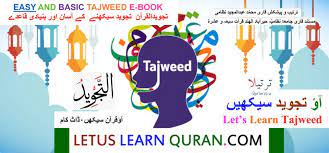EasyTajweed-By-MAMAJEED-EASY AND BASIC TAJWEEDULQURAN E-BOOK




What is Tajweed? | Why is it important to learn Tajweed?
by adminalq | Jun 6, 2021 | HOLY QURAN, ISLAM | 0 comments
What is Tajweed? This article will answer you to know all about this old great Islamic science. The word Tajweed is an Arabic word derived from the root “J-W-D”. This verb means the excellence or enhancement of something. Actually, Tajweed is a group of rules to help Muslims read the Quranic words in the most correct way. It helps in adjusting the pronunciation of each letter during recitation. Studying Tajweed rules can show you the outlets of the Arabic letters. Recitation without Tajweed is like speaking in English without any grammar. This is not only wrong but also bad reading.
Among Muslims, the first one who put the Tajweed rules in a book was Imam Abu Ubaid Al-Qasim. In the third century of Hijra, he collected this science in a book called “Kitab al-qira’at”. The real aim of Tajweed is to read the Holy Quran just like the prophet Mohammed (PBUH). When Islam started to spread out, non-Arabs people couldn’t read Quran correctly. So, Muslims needed the Tajweed science to have certain and clear rules for reading Quran. The Imam Abu Ubaid listened to many reciters and recorded most of them to conclude that there are about 7 right methods of recitation.
Why is it important to learn Tajweed?
Is it important to learn what is Tajweed? Yes, this is a significant mission for many reasons. Our Holy Quran is the book of Allah that was sent to guide us. It is full of stories about the lives of the last prophets and their struggles. Also, our Holy book offers us the laws we should follow. Studying the Quran is so interesting and inspiring because its ayat and words are the revelations of Allah to us. Another remarkable purpose to learn Tajweed is to preserve the Arabic language, the Quran language. Recitation of the Holy Quran using Tajweed rules keeps the pronunciation and the meanings of the ayat.
Surah Al-Mozzammil
“…and recite the Qur’an with measured recitation. (4)”
On the authority of Abdullah bin Amr (may God be pleased with them both) said: The Messenger of Allah (may God’s prayers and peace be upon him) said: “It is said to the owner of the Qur’an: Recite, ascend, and recite, as you used to recite in this world, next to you.”
Those aya and Hadith show us that recitation of the Holy Quran in Tajweed has a great reward from Allah after. Reading the Holy Quran in the right and correct way reaches the hearts faster and easier. In addition, sometimes readers may change the meaning of the words. That is why we should care about learning tajweed and recitation.
What is Tajweed class?
Now, are you ready to learn all about the Tajweed rules? If you are a beginner or a new Muslim, you can found on the http://www.alquranworld.com website the professional tutors who can help you. This good website provides variable classes to learn Arabic and Islam. Our teachers are experienced in supporting non-Arabs students. They have certificated materials that are very helpful for you. If you need to understand every single rule, I recommend the Tajweed rules course.
Tajweed Rules Course:
Tajweed is very important when you do recitation it adds beauty and accuracy to your recitation so we teach you how to do every sound in Arabic how to utter and produce the hard Arabic sounds and where every sound come from and we train you and your mussels to produce it correctly with a pure Arabic accent, we know exactly how to deal with accent problems and what every language has in common with Arabic and what are the similarities and the differences.
What is Tajweed?
The Islamic scientists have classified the Quran Tajweed rules as follows:
1. Noon and Meem Moshaddadah:
The rule is for the letters noon (ن) and meem (م) which have a shaddah mark (نً / مً ) with Ghunnah of 2 beats.
2. Al Qalqalah:
The rule is about the vibration in the sound at the end of pronunciation of some letters: Qaaf (ق), Ttaa(ت), Baa(ب), Jiim(ج) or Daal(د). This can be applied when in the case of sukoon or shaddah. And it includes minor, medium, and major.
3. Noon Sakinah and Tanween:
This rule is for the letter noon (ن) with a sukoon mark. Tanween is the pronouncing of a noon sakinah at the end of the word without writing noon (اً). And it includes Izhaar, Idghaam, Iqlaab, and Ikhfaa.
4. Meem Sakinah:
The rule is put for the letter meem (م) with a sukoon mark on it. And it includes Ikhfaa Shafawy, Idghaam Shafawy, and Izhar Shafawy.
5. Prolongation:
It means giving the letter from two to six beats according to its type.
6. Heavy and light letters:
The Arabic letters are classified into heavy and light letters according to the method of pronunciation.
7. Laam Shamsyiah & Qamaryiah (ل):
It has only two clear rules: Izhar and Idgaam
8. Al Hamzah (أ):
There are two types of hamzah: Hamza-tul Oata’ and it can be at the beginning, in the middle, or at the end of the word. Hamzah-tul Wasl which exists at the beginning of the words and dropped when continuing.
What is Ghunna in Tajweed?
The Ghunnah is an obligatory Harakah for the letters Noon (ن) and Meem (م). It doesn’t matter their place, the rule is the same. The Ghunnah’s exit point is the nose and it has degrees.
The degrees in the Ghunnah’s scale:
- The longest is Idgham or Shaddah:
وَمَا أَنزَلَ اللَّـهُ مِنَ السَّمَاءِ مِن مَّاءٍ فَأَحْيَا بِهِ الْأَرْضَ
“… and what Allah has sent down from the heavens of rain (2:164)”
- During the Ikhfaa:
إِنَّا أَنزَلْنَاهُ فِي لَيْلَةِ الْقَدْرِ
“Indeed, we (Allah) sent the Qur’an down during the Night of Decree. (97:1)”
- With a Sukoon:
كَيْفَ تَكْفُرُونَ بِاللَّـهِ وَكُنتُمْ أَمْوَاتًا فَأَحْيَاكُمْ
“How can you disbelieve in Allah when you were lifeless, and He brought you to life; (2:28)”
- The weakest:
وَنَادَىٰ أَصْحَابُ النَّارِ أَصْحَابَ الْجَنَّةِ أَنْ أَفِيضُوا عَلَيْنَا مِنَ الْمَاءِ أَوْ مِمَّا رَزَقَكُمُ اللَّـهُ
“And the companions of the Fire will call to the companions of Paradise: Pour upon us some water or from whatever Allah has provided you. (7:50)”
https://www.youtube.com/watch?v=LeGvMe5l3oI&list=PLWYqPbyIl2pJhWejHTM3813tTLZarvU2O&index=1